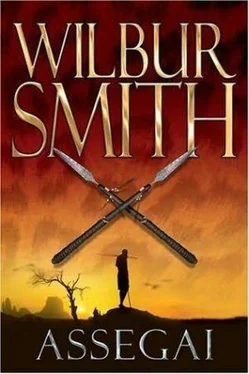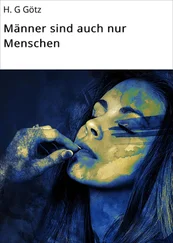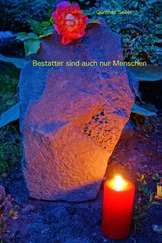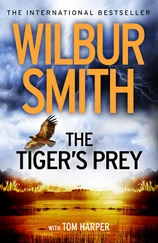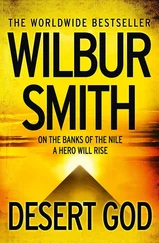They flew on until Eva waved excitedly and pointed out on her side of the fuselage. Graf Otto banked in the direction she was pointing. Then the Butterfly was straight and lined up on five huge elephant bulls, wading through the dense thorny undergrowth a short distance ahead. Although she no longer had the excuse of gravity, Eva gave him another cheeky little bump with her hip. It was a titillating but dangerous game they were playing, right under Graf Otto von Meerbach’s nose. Leon laughed into the wind and, without moving her head, Eva peeped at him through lowered lashes and smiled secretly.
They bore down on the running elephant. Leon saw that they were all old bulls and at least two carried tusks of more than a hundred pounds a side. Another had only a single, the other broken off at the lip, but the remaining one was colossal and dwarfed those of his companions. Otto dropped lower, then lower still, until it looked as though he meant to fly straight into the herd. The elephant seemed to realize that they could not outrun the Butterfly : they turned back and bunched up, shoulder to shoulder, forming a solid phalanx to confront this threat from the skies. Trumpeting so loudly that Leon could hear them above the engine, they charged headlong to meet the aircraft. As she skimmed over them they reared up, flaring their ears, and stretched out their serpentine trunks as though to snatch her out of the air.
Graf Otto climbed several hundred feet above the ground and flew on southwards. New and unexpected vistas opened before them. They flew over hidden valleys, secret re-entrants and salients in the walls of the Rift, some of which were not reflected on any survey map Leon had ever studied. Two or three valleys were fed by streams and pastured with green grass on which herds of large mammals, from giraffe to rhinoceros, had congregated. Leon tried to memorize the exact location of each one so that he could return to explore them, but they were flying so fast he found it difficult to keep track of their progress.
They climbed higher still until they could make out the vast massif of Kilimanjaro looming on the southern horizon a hundred miles or more ahead. The mountain was blue with distance, its crest wreathed in silver cloud through which the sun threw golden blades of light. Then Graf Otto waggled the wings to attract Leon’s attention and pointed out a closer mountain, only twenty or thirty miles off. The table top was unmistakable, and was probably what had attracted his notice.
‘Lonsonyo Mountain!’ Leon cried, but his voice was lost in the roar of wind and engines. ‘Go there!’ He made vehement hand signals, and Graf Otto opened the throttles wide. The Butterfly rose upwards, but the table of Lonsonyo stood almost ten thousand feet above sea level, near the aircraft ceiling. At first she climbed rapidly, but as the altitude increased her speed bled off. She became so sluggish that they cleared the top of the cliffs by no more than fifty feet.
Before them, Lusima’s cattle were spread out as they grazed on the sweet grasses of the high table land. Beyond them Leon picked out the pattern of the huts and cattle pens that formed the manyatta , and signalled to Otto to turn towards the village. Goats, chickens and naked herd-boys scattered at their approach. It was easy to single out Lusima’s hut from the others, for it was the largest and grandest, closest to the spreading branches of her council tree. There was no sign of Lusima until they were almost directly overhead. Then, suddenly, she appeared, ducking out of the low doorway of her hut and staring up at him. She was naked except for her tiny red loincloth, and the colourful bangles and necklaces around her ankles, wrists and neck. She gazed up at the Butterfly with an expression of comical bewilderment.
‘Lusima!’ Leon yelled, and ripped off his helmet and goggles. ‘Lusima Mama! It is me! M’bogo, your son!’ He waved frantically and suddenly she recognized him. He was so close that he saw her face light up and she waved with both hands, but then they were past and dropping down the far side of the mountain.
Once again Graf Otto waggled the wings and, with hand signals, asked Leon to point out the course he should take to reach the hunting camp. They had left it on the far side of Lonsonyo Mountain, so Leon directed him into a right-hand circuit of the sheer cliffs below the table land. He had never seen this side of the mountain before. Up until now, he had always approached and ascended from the southern side.
The rock was as sheer and impregnable as the outer wall of some monumental medieval fortress and lichen had painted on it a patchwork of many colours. Then, unexpectedly, the Butterfly came level with a break in the wall, a vertical chimney of rock, splitting the cliff from the summit right down to the scree slope at the foot of the mountain. Over the lip of the cliff at the top of the chimney spilled a bright cascade of water, a stream that drained the rain-sodden table land above and fell in undulating lacy curtains down the moss-blackened stone. As they passed, the wind blew eddies of fine spray into their faces. It dewed their goggles, and was cold as snowflakes on their cheeks.
The waterfall fell several hundred feet into the pool at the base of the cliff. The sun’s rays did not reach into that dark and mysterious gorge: it was filled with shadow that turned the pool black as an inkwell. It was so perfectly circular that it might have been built by ancient Roman or Egyptian architects. They were only able to gaze on this grand sight for a few short seconds before the Butterfly had sped past it; the rock flue seemed to close behind them with the finality of a massive cathedral door, shutting from view all trace of the waterfall.
When they flew out of the shadow of the mountain, the sun was already turning red as it passed through the haze of dust and smoke that hung low to the horizon. Leon gazed out over the purple plain, searching for his first glimpse of the hunting camp. At last, far ahead, he picked out the silver sausage of the windsock that marked the airstrip floating at the peak of its mast. He signed to Graf Otto to turn towards it, and soon they could make out the cluster of canvas and newly thatched roofs of what Leon had named Percy’s Camp. Just behind it stood a small kopje, no more than a few hundred feet high but visible for many miles.
Graf Otto circled the camp to check the wind direction and the orientation of the landing strip. As they banked around on the far side of his camp, Leon looked down the wing on to a dense, seemingly impenetrable wilderness of hookthorn bushes. It stretched for many miles, and in its midst he spotted another cluster of those dark shapes. By their bulk he knew at once that they were buffalo bulls, three old bachelors. One thing was certain, and that was that those old recluses would be cantankerous and highly dangerous. When they raised their heads and stared malevolently up at the aircraft, Leon evaluated them quickly, then muttered to himself, ‘Not a decent head among them. They’re all wearing yarmulkas .’ It was an irreverent reference to the Jewish prayer cap, used by the old hunters to describe a pair of buffalo horns so old and worn away that the points had gone, leaving only a skullcap of horn.
As Graf Otto touched down and let the Butterfly run out to the far end of the strip, they saw a cloud of dust tearing down the rutted track from the camp. A truck clattered into view with Hennie du Rand at the wheel, Manyoro and Loikot perched standing in the back.
‘So sorry, boss!’ Hennie greeted Leon, when he came down the ladder from the cockpit. ‘We were not expecting you to arrive for another few weeks at least. You’ve taken us by surprise.’ He was visibly flustered.
Читать дальше
